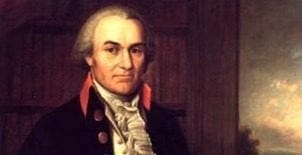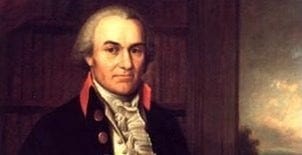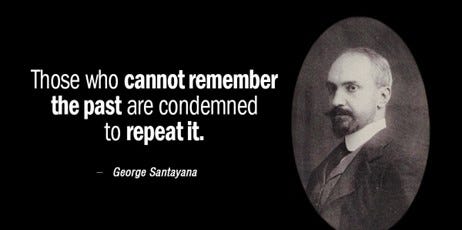Name That “Anti-Federalist”
Remembering America’s forgotten founders, known as the “Anti-Federalists” who insisted that our cherished Bill of Rights must be included in America’s “new” Constitution.
This “Anti-Federalist” [1] was born in New York in 1738. He was an attorney and a New York Supreme Court justice who served on the committee that drafted New York’s Constitution in 1777 after joining Albany’s revolutionary Committee of Safety. He represented New York in four state congresses pre-ceding and after America’s Declaration of Independence.
As a New York delegate to the 1787 Constitutional Convention joining delegate John Lansing, Jr. and junior delegate Alexander Hamilton, he was 50 years old when he voiced his many concerns about creating a centralized government with no Bill of Rights. He and John Lansing, Jr. left the Convention by July 1787, explaining to New York Gov. George Clinton that the Convention exceeded their instructions to revise the Articles of the Confederation and was creating a whole new national government that would supersede the sovereignty of the thirteen republics that made up the United States of America.
He then began to write essays to support his reasons why creating a national government would be dangerous to the people. His essays became known as Brutus in the Anti-Federalist Papers. Historians credit the author of the Anti-Federalist Papers known as Brutus with writing the most comprehensive and cohesive arguments warning of the dangers of creating a national government.
After his publication of Brutus 1 on October 18, 1787, arguing his opposition to the “new” Constitution, Alexander Hamilton published his pamphlet on October 27, 1787 to the people of New York, advocating for the “new” Constitution which is now known as Federalist Paper #1 and thus began the written debate now known as the Federalist Papers and Anti-Federalist Papers.
Although some historians question the identity of Brutus[2], most historians agree that most of the writings of Brutus were written by this New York delegate.
When New York voted to ratify the constitution in 1788, he voted “Nay” to the ratification of the “new” Constitution.
Here’s an excerpt from Brutus 1:
“Let us now proceed to enquire, as I at first proposed, whether it be best the thirteen United States should be reduced to one great republic, or not? It is here taken for granted, that all agree in this, that whatever government we adopt, it ought to be a free one; that it should be so framed as to secure the liberty of the citizens of America, and such a one as to admit of a full, fair, and equal representation of the people. The question then will be, whether a government thus constituted, and founded on such principles, is practicable, and can be exercised over the whole United States, reduced into one state?
If respect is to be paid to the opinion of the greatest and wisest men who have ever thought or wrote on the science of government, we shall be constrained to conclude, that a free republic cannot succeed over a country of such immense extent, containing such a number of inhabitants, and these increasing in such rapid progression as that of the whole United States. Among the many illustrious authorities which might be produced to this point, I shall content myself with quoting only two. The one is the baron de Montesquieu . . . . “It is natural to a republic to have only a small territory, otherwise it cannot long subsist. In a large republic there are men of large fortunes, and consequently of less moderation; there are trusts too great to be placed in any single subject; he has interest of his own; he soon begins to think that he may be happy, great and glorious, by oppressing his fellow citizens; and that he may raise himself to grandeur on the ruins of his country. In a large republic, the public good is sacrificed to a thousand views; it is subordinate to exceptions, and depends on accidents. In a small one, the interest of the public is easier perceived, better understood, and more within the reach of every citizen; abuses are of less extent, and of course are less protected.” Of the same opinion is the marquis Beccarari. . . .
In a free republic, although all laws are derived from the consent of the people, yet the people do not declare their consent by themselves in person, but by representatives, chosen by them, who are supposed to know the minds of their constituents, and to be possessed of integrity to declare this mind.
In every free government, the people must give their assent to the laws by which they are governed. This is the true criterion between a free government and an arbitrary one. The former are ruled by the will of the whole, expressed in any manner they may agree upon; the latter by the will of one, or a few. If the people are to give their assent to the laws, by persons chosen and appointed by them, the manner of the choice and the number chosen, must be such, as to possess, be disposed, and consequently qualified to declare the sentiments of the people; for if they do not know, or are not disposed to speak the sentiments of the people, the people do not govern, but the sovereignty is in a few. Now, in a large extended country, it is impossible to have a representation, possessing the sentiments, and of integrity, to declare the minds of the people, without having it so numerous and unwieldy, as to be subject in great measure to the inconveniency of a democratic government.
The territory of the United States is of vast extent; it now contains near three millions of souls, and is capable of containing much more than ten times that number. Is it practicable for a country, so large and so numerous as they will soon become, to elect a representation, that will speak their sentiments, without their becoming so numerous as to be incapable of transacting public business? It certainly is not.
In a republic, the manners, sentiments, and interests of the people should be similar. If this be not the case, there will be a constant clashing of opinions; and the representatives of one part will be continually striving, against those of the other. This will retard the operations of government, and prevent such conclusions as will promote the public good. If we apply this remark to the condition of the United States, we shall be convinced that it forbids that we should be one government. . . .
In despotic governments, as well as in all the monarchies of Europe, standing armies are kept up to execute the commands of the prince or the magistrate, and are employed for this purpose when occasion requires: But they have always proved the destruction of liberty, and [are] abhorrent to the spirit of a free republic. In England, where they depend upon the parliament for their annual support, they have always been complained of as oppressive and unconstitutional, and are seldom employed in executing of the laws; never except on extraordinary occasions, and then under the direction of a civil magistrate. . . .
The confidence which the people have in their rulers, in a free republic, arises from their knowing them, from their being responsible to them for their conduct, and from the power they have of displacing them when they misbehave: but in a republic of the extent of this continent, the people in general would be acquainted with very few of their rulers; the people at large would know little of their proceedings, and it would be extremely difficult to change them. . . In a republic of such vast extent as the United-States, the legislature cannot attend to the various concerns and wants of its different parts. It cannot be sufficiently numerous to be acquainted with the local condition and wants of the different districts, and if it could, it is impossible it should have sufficient time to attend to and provide for all the variety of cases of this nature, that would be continually arising.
In so extensive a republic, the great officers of government would soon become above the control of the people, and abuse their power to the purpose of aggrandizing themselves, and oppressing them. The trust committed to the executive offices, in a country of the extent of the United-States, must be various and of magnitude. The command of all the troops and navy of the republic, the appointment of officers, the power of pardoning offences, the collecting of all the public revenues, and the power of expending them, with a number of other powers, must be lodged and exercised in every state, in the hands of a few. When these are attended with great honor and emolument, as they always will be in large states, so as greatly to interest men to pursue them, and to be proper objects for ambitious and designing men, such men will be ever restless in their pursuit after them. They will use the power, when they have acquired it, to the purposes of gratifying their own interest and ambition, and it is scarcely possible, in a very large republic, to call them to account for their misconduct, or to prevent their abuse of power.
These are some of the reasons by which it appears that a free republic cannot long subsist over a country of the great extent of these states. If then this new constitution is calculated to consolidate the thirteen states into one, as it evidently is, it ought not to be adopted.”
Historians describe his notes on the 1787 Constitutional Convention as more comprehensive than James Madison’s notes of the Constitutional Convention.
On July 26, 1788, New York ratified the Constitution in a vote 30-27, but with 31 proposed amendments attached.
[1] In Anti-Federalist No. 3, “A Farmer” discusses 18th century “newspeak” of the term “Anti-Federalist” “:…The term federalist is therefore improperly applied to themselves, by the friends and supporters of the proposed constitution. This abuse of language does not help the cause; every degree of imposition serves only to irritate but can never convince. They are national men, and their opponents, or at least a great majority of them, are federal, in the only true and strict sense of the word.”
[2] It is possible that New York Anti-Federalist Melancton Smith contributed to the writings of Brutus although he did not attend the 1787 Constitutional Convention, he was a delegate of the New York Convention and voted “Yea” to ratification of the Constitution, but only with a Bill of Rights attached.







I have never been aware of the fact that the ANTI-Federalist, Yates, started the discussion and AFTER this Hamilton wrote Federalist paper #1! Amazing.
Perhaps it is Yates we should thank for stirring the pot and our eventual Bill of Rights?
It does appear that his concern was actually for the potential for state governments to be completely dissolved in favor of an over-arching Federal Superstructure rather than state governments remaining in the picture.
Yates arguments do well to point to the real concerns of big bureaucracy, big shots taking the power and abusing it, and no way to remove or stop the abuse of the people. This DID come true.
However, I see no proposed structure of government that can be a reasonable alternative. It really is a conundrum!
Great Info. America has forgotten about all those who came before, so we could have a voice,
Thanks.